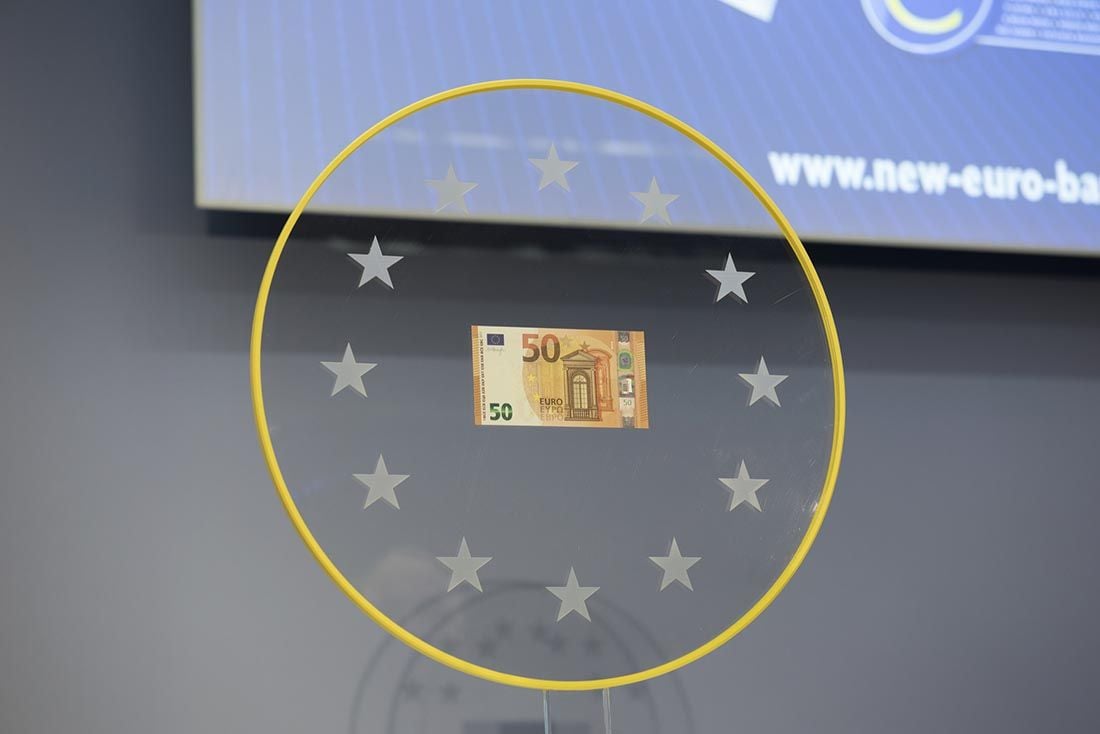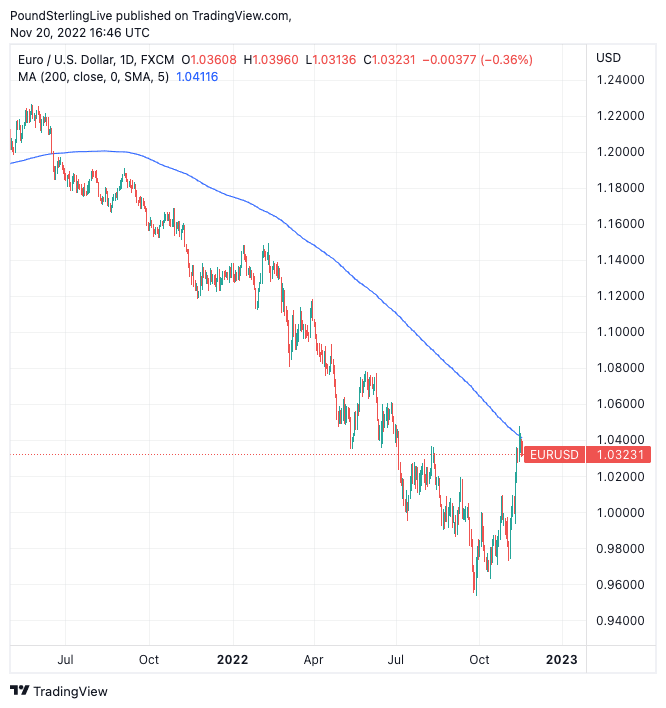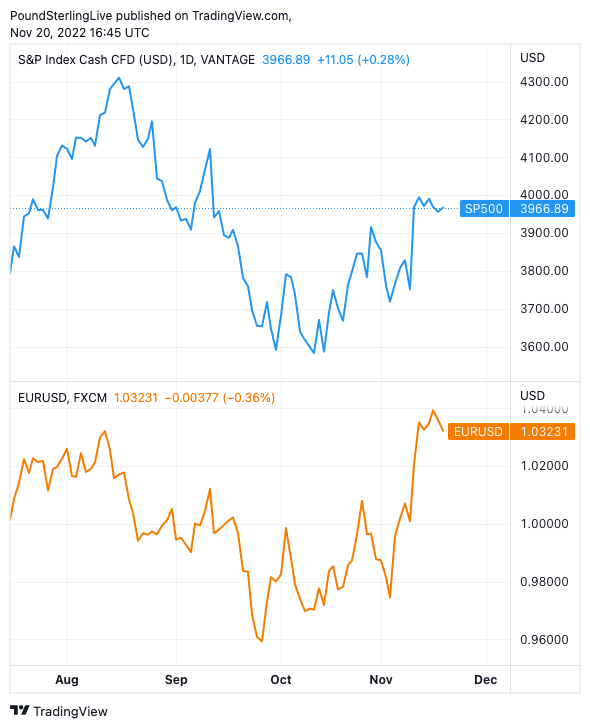EUR/USD Week Ahead Forecast: "Growing Downside Risks"
- Written by: Gary Howes
- EUR/USD short-term technicals positive
- But some analysts see risks of a turn lower again
- Watch Eurozone PMIs
- USD awaits Fed speakers

Image © European Central Bank
The Euro remains elevated and starts a new week near recent trend highs against the Dollar, amidst an improving technical setup, elevated European Central Bank interest rate hike expectations and the broader retreat in the Dollar.
The Euro to Dollar exchange rate (EUR/USD) rose to a multi-month best at 1.04774 last week, before paring advances to 1.0362.
"I feel it will need some decent improvement to get euro to take another leg higher from here. A close above the 200 day now coming in at 1.0410 now would be a positive signal, back below 1.0270 would have shorter term bulls giving up," says a note from JP Morgan's institutional currency dealing desk.
Above: EUR/USD at daily intervals showing a kiss of the 200-day moving average, if this fails to break the exchange rate will respect the downward direction of this moving average. To better time your payment requirements, consider setting a free FX rate alert here.
Nevertheless, short-term technicals remain supportive of EUR/USD which is now 5.0% higher than one month ago, confirming that the near-term trend favours appreciation.
Shaun Osborne, head of foreign exchange strategy at Scotiabank, says EUR/USD short-term studies are bullish.
"Short-term trading patterns (bullish pennant) suggest EURUSD is consolidating ahead of a renewed push higher," says Osborne.
Scotiabank's strategists think that short-term trends and momentum are Euro-positive and that spot can challenge retracement resistance in the low 1.05s in the next week or so. "Support is 1.0315 intraday".
Compare EUR to USD Exchange Rates
Find out how much you could save on your euro to US dollar transfer
Potential saving vs high street banks:
$2,750.00
Free • No obligation • Takes 2 minutes
The main data event for the Euro in the week ahead is the release of the Eurozone's PMI for November, due on Wednesday at 9:00 GMT.
The Manufacturing PMI is expected to read at 46.0, down from October's 46.4; the Services PMI is forecast at 48.1, down from October's 48.6 and the Composite PMI is expected at 47.0, down from 47.3.
"We see growing downside risks for EUR/USD from current levels ahead of the Eurozone November PMIs," says Valentin Marinov, Head of G10 FX Strategy at Crédit Agricole.
The data will inform market expectations for the number of upcoming interest rate hikes likely from the European Central Bank (ECB), with stronger-than-expected data likely to support expectations for further rate hikes.
ECB President Christine Lagarde made clear ahead of the weekend that there was more work to be done on interest rates, confirming the central bank is not ready to consider slowing the pace of hikes.
"We expect to raise rates further – and withdrawing accommodation may not be enough. Ultimately, we will raise rates to levels that bring inflation back down to our medium-term target in a timely manner," she said in a speech delivered in Frankfurt.
As long as ECB rate hike expectations remain elevated, supported by such commentary from the ECB, the Euro can receive a degree of support.
Above: The S&P 500 stock index top and the EUR/USD, showing the positive correlation, the message? Also Keep an eye on global equity market sentiment for direction into year-end. If you are looking to protect or boost your international payment budget you could consider securing today's rate for use in the future, or set an order for your ideal rate when it is achieved, more information can be found here.
For the Dollar, the coming week is short because of the Thanksgiving holiday starting on Thursday.
Ahead of this, a number of Federal Reserve governors will attempt to warn markets that the interest rate hiking cycle is far from over, in order to try and ensure the recent relief rally doesn't result in a loosening of financial conditions.
Watch out for Master, George and Bullard, all due to speak on Tuesday.
Recent pushback efforts by Fed members have however failed to leave a lasting impact on the Dollar, suggesting markets are now well prepared for a slowing down in the rate hike cycle that will see a downshift to a 50 basis point hike in December.
Thereafter a number of smaller hikes will follow, taking the upper end of the Fed's rate band to around 5.0%.
It will likely take a material upshift in this end destination to rejuvenate the Dollar rally.
The data highlight of the week falls on Wednesday with the release of core durable goods orders (13:30 GMT), expected to read at 0.1% month-on-month in October.
Continuing jobless claims are also due for release at the same time, and a reading of 1.500K is expected.
The Dollar's reversal lower in the wake of November 10's U.S. inflation release has been spectacular, but Marinov says "the worst of the USD selloff seems to be behind us and we expect the currency to gradually recover more broadly given that it no longer looks as overbought and overvalued as before."
Such a development would likely herald the end of EUR/USD's advance.
The Dollar fell after headline U.S. CPI inflation recorded 0.4% month-on-month growth in October, slower than the consensus estimate of 0.6% and matching September's 0.4%. In the year to October inflation rose 7.7% said the U.S. Bureau of Labor Statistics, defying estimates for 8.0% and marking a sharp slowdown on September's 8.2%.
"An unexpected slowdown in US inflation boosted risk sentiment and hurt the USD. But we think markets went too far too soon, as conditions are not right yet for a sustained drop in the dollar," says Thomas Flury, Strategist at UBS Switzerland AG.
The risk for those wanting a stronger Euro is therefore that the trend of recent weeks comes to an abrupt end.
"We expect the USD to recoup some of the losses in the near term, since a sustained drop - which we expect to happen later next year - would require stronger data showing inflation is slowing and a rebound of global trade," says Flury.
Compare EUR to USD Exchange Rates
Find out how much you could save on your euro to US dollar transfer
Potential saving vs high street banks:
$2,750.00
Free • No obligation • Takes 2 minutes






